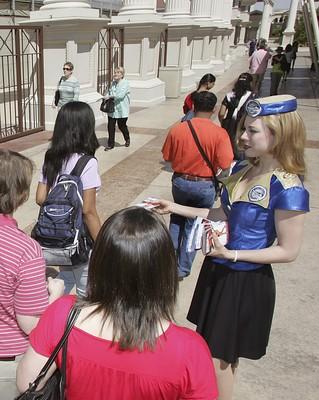Pointing in a new direction

The young woman in the futuristic purple and gold space dress with a plunging neckline looks out of place standing in front of an ancient Roman-themed resort, which means she fits right into a Strip scene that can be as surreal as it is sinful.
That’s why she gets double takes from some passers-by and not a glance from others even when she extends her gloved hand, a booklet and a greeting: “Hi. Some monorail information?”
Most people don’t take the Monorail Quick Guide, much like the monorail itself. Since its launch in 2004, the monorail has struggled to attract riders in the numbers anticipated. Last year, its credit rating fell to “junk” bond status.
However, Las Vegas Monorail Co. officials and co-sponsor Sprint hope the sexy, young monorail ambassadors such as Angelina Russo will drum up some business. After all, Las Vegas owes a fair amount of its fame to sexy, young showgirls.
Russo and 19 other ambassadors took to the streets, the Las Vegas Strip specifically, last August in snazzy, futuristically retro outfits. They show a little leg and a bit of cleavage, subtly suggesting that the monorail is sexy and a must-see.
With her perfectly coifed blond hair and superstar makeup, Russo is the monorail’s go-to ambassador for advertisement and media coverage. On a recent Friday, she was enlisted to film a monorail commercial on the sidewalk near Caesars Palace while she handed out booklets full of coupons and a map. It costs $5 for one ride on the monorail, $9 for two.
Since the ambassadors’ debut, ridership has increased, says Angela Torres, monorail spokeswoman. It’s hard to gauge the impact, but more than 4 percent of the coupons are redeemed each month, she adds. In March, an average of 20,552 people rode the train every day, up from the monorail’s low point, an average of 15,430 a day in December.
Whether their presence is responsible for that increase is unclear; they could just as well be responsible for increasing bus ridership or foot traffic through a variety of places, for all the directions they give out.
The ambassadors are positioned in key areas where they encounter a lot of pedestrians, including the Roman Plaza at Caesars Palace; near The Venetian; in front of The Mirage’s volcano, and near the northern entrance to Harrah’s Las Vegas. They work five-hour shifts, starting about 10 a.m. and ending before 4 p.m. Thursdays through Mondays. Wages start at $15 an hour.
“How do you get to the Forum Shops?” one woman asks as she passes by.
“Up these stairs and to the right,” Russo directs.
Russo remains pleasant and approachable no matter the request because each encounter could potentially turn someone on to the monorail, she says.
“I just wondered if this is the right way to get to the Sahara? Is there any place to catch a bus?” another woman stops to ask.
“Yes, but you can take the monorail to the casino. There’s a station right here in the Flamingo,” Russo says, handing the woman a booklet and directing her to the station where she can catch the train.
Most people take her for some kind of official guide, Russo says; it’s the uniform and hat. Still others have mistaken her for a mannequin or a living statue.
“We’re kind of like Elvis and showgirls, we’re an attraction,” Russo says, explaining why many tourists take photos of her or pose with her. “We’re like Mickey and Minnie Mouses.”
On occasion, someone knows who she is just by the uniform.
“You look like the monorail girl today. Or one of them,” says Bill Ehmke, a tourist from New York. He and his girlfriend, Susan Kroll, approach Russo to ask for help getting to the Shark Reef at Mandalay Bay.
As an engineer, Ehmke says it’s his business to know about the monorail and support it. He doesn’t understand why more people don’t ride it.
“We’ve been to Disneyland, everyone loves monorails,” he says.
But the ambassadors are a great way to get the word out, he adds, because the women are pretty and the uniforms snazzy.
“She looks like she just came out of George Jetson,” Kroll says, giving her boyfriend a warning not to look too much.
The costumes — developed and designed by the monorail company and Undercover Productions, the company that provides the ambassador service — were chosen because they’re reminiscent of old-fashioned cocktail waitress uniforms, Torres says.
But when Russo’s walking with her briefcase on wheels (full of monorail pamphlets), people often ask her what airline she flies for, she says.
And the costume tends to dehumanize them, giving people the idea that they can do or say just about anything, such as the time a man made an X-rated comment to her or the days when guys propose, she says.
“I think I’ve gotten asked out to dinner a couple times, too,” Russo says.
“I don’t think people realize we’re real people and have feelings.”












